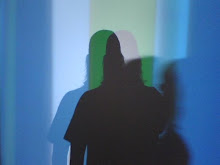
I first saw Synecdoche, New York last November at the Lucas Theatre in downtown Savannah, GA. Only one screening was scheduled, at 11:30am, and--despite my general distaste for waking up earlier than noon--I made a point of being there. It was playing as part of the Savannah Film Festival and was, by far, the most important screening of the week to me.
I watched the film with great interest and attention. As the directorial debut of Charlie Kaufman (for my money, the best and most provocative screenwriter working today), I knew going in that Synecdoche promised to be, for lack of a better word, complex. I left the Lucas two hours later feeling emotionally overwhelmed, mentally exhausted, and oddly satisfied. The scope and vision was even greater than I'd expected; it seemed too much to absorb in one sitting. (Such is sometimes the problem with Kaufman's films: trying to make sense of what you're seeing and hearing can ultimately prove futile.) My mild discombobulation notwithstanding, I liked the film very much and thought it an extremely impressive cinematic achievement. I began recommending it to friends and family immediately.
A little more than a month later, I was back in Seattle where I saw Synecdoche for a second time at the Guild 45th. Again, I was awed by the territory explored and, again, felt a deep connection and satisfaction with the movie. But, even after two viewings, the entire weight of the movie had yet to fully set in. I knew by now that it was the best film I'd seen all year by leaps and bounds, but I could also feel that there was something more hidden beneath the surface; some sort of further emotional punch which could not be forced or even coaxed, but would reveal itself if given the opportunity.
Fast-forward six weeks or so. Shortly after arriving in Georgia, I signed up to receive emails from the Coligny Theatre on Hilton Head Island, SC. Toward the end of January, I received an announcement that Synecdoche would begin a one-week run at the Coligny that Friday. So the next week, after working for eight hours, I drove straight up to Hilton Head for the 7pm show.
Roger Ebert starts his review of Synecdoche with these words: "I think you have to see Charlie Kaufman's Synecdoche, New York twice." Perhaps it has something to do with the fact that Ebert has been doing this movie-watching thing a lot longer than I have, but I needed three times. Upon leaving the Coligny Theatre after Round 3 of Synecdoche, I could hardly separate my own life from that of the film's protagonist. I had become Caden Cotard and Caden Cotard had become me. His life and my life were the same life. (And if you just took the two previous sentences literally, you'll likely need to watch Synecdoche ten times or more before it clicks.)
Great art and literature serve their highest purpose when they act as a mirror for the viewer. If you see a painting or read a book or watch a film and, from that, are able to reflect on some part of your own life, then greatness has been achieved. Synecdoche, New York is possibly the greatest artistic mirror I have ever viewed. The whole film is a reflection on human life; any human life, every human life, ALL human life.
When talking with people who have yet to see Synecdoche, I'm often asked what the movie is about. Never have I experienced such difficulties in describing a film.
A very brief description of what happens in Synedoche, New York:
A modestly successful theatre director, Caden Cotard (Philip Seymour Hoffman), seems to have slipped into a semi-surreal version of his life. He lives out the last half of his life in this surreality--being abandoned by his wife and child, carrying on dysfunctional relationships with other women, directing a theatre piece of ridiculous proportions--and we, the viewer, are taken along for the ride.
But while the events of Synecdoche are certainly important, they in no way provide an understanding of what the movie is about. The closest I've come to accurately describing the film is this: one man tries to sort out the details and meaning and truth of his life. Seriously, that's the best I can do. See it for yourself and try to come up with something better.
For almost five years, Krzysztof Kieslowski's Blue has occupied the top slot on my All-Time Best Films list (which, admittedly, exists primarily in my mind). I've seen some great films in the past five years, but nothing has even come close to Blue. Until now. I'm not ready to crown Synecdoche as my new Favorite Film but I'd be doing it a disservice if I failed to note that the matter is under consideration.
Synecdoche, New York is a film without parallel, the most complete document of the human experience I have ever witnessed, bar none. I don't know what more I can say.

Synecdoche, NY is my top film of 08 too. You my boy. I agree with your take on it. Like you said, it might make its way to on to my list of best films of all time in the near future. It's appalling how little end-of-the-year attention this film received.
ReplyDelete